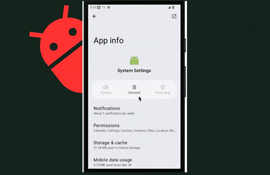Monthly Archives: April 2025
-
Read moreA hacker identified as @303 has allegedly breached an Indian software company on December 19, 2024, leaking a massive dataset of sensitive policyholder and admin data from companies like HDFC Ergo, Bajaj Allianz, ICICI Lombard, and more. This breach adds to the growing wave of cyberattacks targeting India’s insurance industry.
-
Read moreCybersecurity experts have uncovered a dangerous malware campaign where hackers mimic the Google Chrome install page to trick Android users into downloading a powerful spying tool called SpyNote. These fake pages look nearly identical to the real Google Play Store and are hosted on newly registered shady domains. When users fall for the trick and install the app, they unknowingly give hackers full control of their device.
-
Read moreAn Indian Air Force (IAF) C-130J aircraft flying over Myanmar during the Operation Brahma relief mission was hit by a dangerous GPS-spoofing cyberattack. The attack could have misled the aircraft, but the pilots swiftly switched to an internal system to stay safe. Here's what happened and why GPS spoofing is a growing cyber threat.
-
Read moreA new email-based cyberattack tricks users into either giving away their Office365 login details or installing malware disguised as a Microsoft app. The attack uses trusted platforms like files.fm to appear legitimate and targets businesses and professionals using a double-threat strategy.
-
Read moreA dangerous new malware named GIFTEDCROOK is targeting Ukrainian government systems. Disguised in phishing emails, this malware is designed to steal sensitive browser data and exfiltrate it through Telegram, making it hard to detect. Cybersecurity experts are warning that this attack is part of a growing trend in cyber-espionage by threat actors.
-
Read moreThe infamous Vidar Stealer malware has returned with a dangerous new trick—pretending to be Microsoft’s BGInfo.exe, a tool trusted by IT professionals. This new version is designed to silently steal browser cookies, stored passwords, and crypto wallet data.
-
Read moreCybersecurity agencies including CISA and FBI have issued a warning about the growing use of a stealthy cyberattack technique called Fast Flux, used by hackers to hide malware servers, enable phishing websites, and build resilient command-and-control (C2) systems.
-
Read moreCybersecurity researchers have discovered a dangerous new Android spyware app that uses password protection and Android overlay tricks to stay hidden and prevent uninstallation. Installed by someone with physical access, this app secretly spies on the victim while making it very hard to remove.
-
Read moreOracle has confirmed a major data breach targeting its older Gen 1 servers, exposing sensitive authentication data, usernames, and hashed passwords. The attacker gained access using an old Java exploit and demanded a $20 million ransom.
-
Read moreCybersecurity researchers have discovered a new Android malware, Salvador Stealer, which is designed to steal banking credentials and one-time passwords (OTPs). This malware pretends to be a legitimate banking app, tricking users into entering sensitive financial details.















